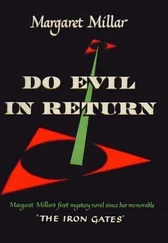He stopped to wipe the sweat from his face with his handkerchief.
“... and swore at her,” Dunlop said in his quick uninterested monotone, “but she was limp as a rag.”
Loftus appealed to Cordwink: “I’ve admitted everything. Why does he have to take all this down?”
“It’s routine, for one thing. For another, the statement you’re making now will have to be checked with your written confession for discrepancies.”
“But I’m guilty, I’ve...”
“No matter if you write five hundred confessions, you still have to be tried in a court of law to determine the degree of your guilt.”
“Yes. Yes, I see now. I didn’t realize.” I sound so meek, Loftus thought. I don’t sound like a murderer at all. Maybe I would be more convincing if I acted belligerent, but I hardly know how.
“Are you ready to continue, Loftus?”
“I... yes, of course. Margolis said he couldn’t take Mrs. Barkeley home in that condition, and he asked me if I’d mind helping him get her out to his cottage. It wasn’t the first time I’d heard of his cottage. There were rumors around the hospital... I was there so much that I got to know quite a few of the nurses, and that’s how I first heard of Margolis and his affairs.”
“The cottage was just outside the city limits, on the river. It didn’t look like much on the outside, but it was fixed up nice inside — leather furniture and a stone fireplace and some good reproductions hanging on the walls, a Van Gogh, I remember, was one of them.”
“Tell me more about the fireplace,” Cordwink said.
“Well, there were a pair of fishing rods, crossed, on the wall above it, and on the mantel itself there were several of those big German steins and two hunting knives in leather sheaths.”
“Dunlop...” Cordwink made a half-turn. “Was the inside of Margolis’ cottage described in any of the papers?”
Dunlop put down his pencil. “A couple of Detroit papers carried a shot of the outside, and the Tribune , I think it was, had a shot of the floor where Margolis was found — bloodstains, et cetera.”
“No fireplace in the picture?”
“No fireplace.”
Loftus smiled anxiously. “I don’t read the Tribune anyway, sir.”
“All right, go on.”
“I helped Margolis carry her inside the cottage and put her on the davenport. She was still out cold. Margolis was very angry by this time. I think the two of them must have been quarreling earlier in the evening, and that this was a final straw for Margolis. He began calling her names and shaking her again. It was an ugly scene. I thought of all the things I’d heard about Margolis around the hospital. I thought of — well, it doesn’t matter what I thought. I went over to the fireplace. The fire was lit and the room was beginning to get very warm. I picked up one of the hunting knives and took it out of its sheath. Margolis wasn’t paying any attention to me. He’d forgotten I was there. I was just a bum, a nobody, a... well, then I did it. I stabbed him in the neck. I’m not very strong and I thought his neck would be the easiest place. It wasn’t easy. I had to stab him four or five times. He fell after the first stab, but he didn’t die right away. He kept sort of flopping around on the floor. The blood was terrible. It got all over me, my gloves and my coat and pants. And the smell — I began to retch. I ran for the door, and I kept on running. I lost my head, forgot about the girl, forgot about everything. All I wanted to do was get away from that blood, that smell. I went home by side streets. I don’t know how far I walked, two miles, three miles. No one noticed me particularly. It was late, and it was snowing, big feathery flakes of snow that clung to my clothes and hid the stains. The house was dark when I got home. I let myself into my room and took off the clothes that had blood on them and put them in the back of the wardrobe. That’s where they are now.”
“In the wardrobe,” Cordwink said.
“Yes, 611 Division Street, the left front room. It has its own entrance, that’s why the landlady calls it an apartment.”
“What did you do on Sunday?”
“I was very weak, I had to stay in bed.”
“Didn’t see any papers?”
“Not until early Monday morning, that is, this morning. As soon as I read that Mrs. Barkeley was being held, I went down to the jail to see you. You were busy, and I waited in the corridor. Mr. Meecham saw me there.”
Meecham nodded. “Yes, I saw him.”
“Well, I didn’t,” Cordwink said. “What happened, Loftus? Lose your nerve?”
“No. I suddenly realized, as I was sitting there, that there were a lot of things I hadn’t attended to, and that I’d never get a chance, once I’d confessed. So I walked out again.”
“A lot of things you hadn’t attended to, such as what?”
“Personal things. I closed my bank account, and sold my car, things like that.”
“Listen to this, Loftus.” Cordwink turned over the pages until he found what he was looking for. “ ‘I stabbed Margolis deliberately and with intent to kill, and not to protect Mrs. Barkley or myself.’ You still claim that?”
“Better think before you answer,” Meecham said. “That deliberation and intent business will...”
“Keep out of this, Meecham,” Cordwink said, scowling. “You’re not his lawyer.”
“He needs one.”
“He’ll get one.” Cordwink faced Loftus again. “Have you any money?”
“A little, yes. The past few months I’ve been able to work. I’m an accountant. That’s what my treatments have been for, not so I could live longer, but so I could carry on with my job, live more efficiently.”
“How much money? Two thousand? One?”
“Oh, not that much.”
“Lawyers come high. The more crooked they are, the bigger their price. That’s how they stay out of the booby hatch, by rubbing the lesions on their conscience with greenbacks.”
Loftus looked a little puzzled. “Well, if I have to have a lawyer, Mr. Meecham will suit me fine. He’s been very kind.”
“Kind?” Cordwink raised his eyebrows, exaggeratedly. “This I must hear.”
“When he thought I was just a bum, he offered me two dollars.”
“Well, well. Where’d you get the two dollars, Meecham, selling phony oil shares to war widows?”
Meecham’s smile was a little strained. “I object to the question on the grounds that it is intimidating and forms a conclusion.”
Dunlop put down his pencil, and said, with a faint whine, “When everybody keeps talking like this, I don’t know what to write down. Everybody shouldn’t keep talking like this.”
“Don’t write anything,” Cordwink said. “Call a patrol car and take Loftus down and book him.”
I’m going to jail , Loftus thought. But he still couldn’t quite believe it. Jail was for criminals, for thieves and thugs, for brutal angry lawless men. He said, with the surprise and disbelief evident in his voice: “I’m going to... to jail?”
“For the present, yes.”
“Why do you say, for the present?”
“We have no facilities at the jail for looking after a dy— a sick man. There’s a prison ward at the County
Hospital. You’ll be transferred there eventually.”
“The County Hospital.” Loftus laughed, holding his hands over his belly. It hurt him to laugh, but he couldn’t help it. “That’s funny, isn’t it? The final irony. After all that’s happened, I’ll end up where I started — in a ward at the County Hospital.”
The sound of his laughter faded, though his mouth kept grinning. He saw Cordwink and Meecham exchange uneasy glances. “You’re uncomfortable, aren’t you? — disturbed? — you wish you’d never seen me? Yes, it’s the same everywhere I go, I make people uncomfortable. I don’t have any friends. No one wants to be near me, people are afraid to be near a man who’s walking a step ahead of death. I make them too conscious of their own fate, and they hate me for it. I’m not blaming them, no, I understand how they feel. I loathe myself more than anyone could loathe me. I loathe this decaying body that I’m trapped inside, hopelessly trapped inside. This isn’t me, this grotesque body, it is my prison. What prison have you to offer that could be half so terrible?”
Читать дальше







![Маргарет Миллар - Rose's Last Summer [= The Lively Corpse]](/books/384369/margaret-millar-rose-s-last-summer-the-lively-c-thumb.webp)



